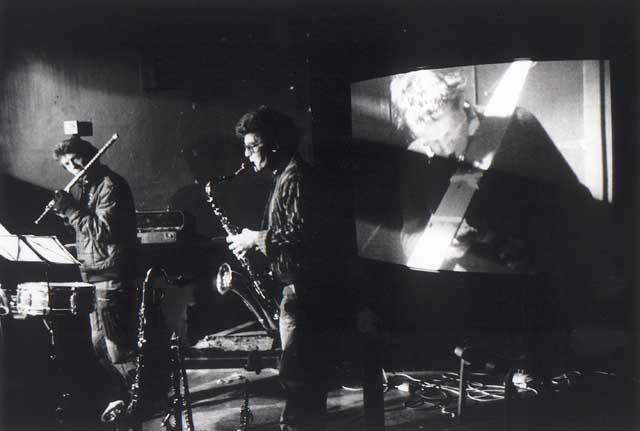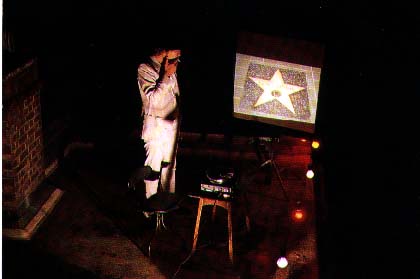
|
RICHARD PHILPOTT
|
 |
Richard Philpott: FILMS |
| HELLO HEN (1973, 2 mins) |
unavailable |
||
THE ACTRESS & THE BISHOP (1974, 15 min) |
unavailable |
||
| A PROPOS DE ILFRACOMBE (1974, Standard 8mm, 12 mins) |
unavailable |
||
| Diary 30 April 1977 (1977, Standard 8mm) |
|||
| Diary 17 Dec 1978 (1978, Standard 8mm) |
|||
| ZOOM CIRCLES (1978, Standard 8mm, 3 mins ) |
|||
| HUNGERFORD BRIDGE (1977, Standard 8mm, 4 mins ) |
|||
SONATA (1978, Standard 8mm, 4 mins) |
|||
| BERLIN BLITZ (unfinished) |
unavailable |
||
| DEAD PIGEON (first version) (10 mins) |
unavailable |
||
NEWSREEL ONE - THE BUILD-UP
|
|
||
| THE UNDERGROUND (1983; 16mm Commag; B & W; 6 mins 30"; 234ft/72m) |
An over-the-top lyrical 'comedy' comprised of the clichQ of 'the look', alienation, desire, romance, movement, transport, the big city, and Liszt's piano transcription of Wagner's Isolden's Liebestod. Two women yearn for each other as they approach an underground station. As the music climaxes, the image explodes! | ||
| THE GREAT ARCHWAY LAND SCULPTURE (9 mins) |
unavailable |
||
| STOLPORT - DOCKLANDS (3 mins) |
unavailable |
||
| LONDON'S WILDLIFE (3 mins) |
unavailable |
||
| GAME II (1982-83; 16mm Commag; colour; CinemaScope; 8 mins 30"; 306ft/93m) |
A CinemaScope filmic record of a multi-media part-mobile light-sculpture and accompanying sound, made by Flipot as part of a series of "game" pieces. This one refers to four states of society from the prehistoric to the highly organised/political. The image has the quality of a speeded-up city at night which is revealed as a sculpture by flashes of lightning while the soundtrack evokes the noise of industry. | ||
| NEWSREEL TWO - WE OBJECT! (1983-84, 16mm, optical, B&W, 24 mins) |
Archway Road Movie Group. The first of two newsreels campaigning to prevent the building of a major new motorway in London, following fifteen years of protest and three ‘public’ inquiries. Made by members of the community, the film reveals the appalling living conditions on the Archway Road, the fallacy of the motorway-building ‘solution’ and the big businesses that benefit from and demand such motorway schemes despite enormous human and environmental cost. | ||
| ROAD MOVIE (1984; 16mm Optical; Colour and B&W; 108 mins; 3888ft/1185m) 1st UK broadcast - 8th July.1985 |
"A hard-hitting documentary in which the arguments of the Road Lobby are pitted against those of environmentalists and the ordinary people whose lives are threatened by the effects of new motorway and urban highway schemes...the film's parameters extend to wider and universal arguments, including the priorities given to car users over those on public transport, the question of pollution and the demise of communities divided by busy highways. A film sure to provoke much discussion." - Tyneside International Film Festival |
"Horror, comedy and commitment...very different to the average documentary. its breadth is impressive and its radicalism thorough-going...universally well received." |
"Road Movie will come either as a shock or a revelation. It's a fiercely committed piece which draws some fundamental and disturbing conclusions for all of us...a fascinating example of how local people can get together to put their views across in a medium normally reserved for the rich or influential" - Finchley Times "fascinating...deliberately provocative in its challenge to the Road Lobby and to dominant styles of documentary filmmaking" - Hendon Times "Road Movie will come either as a shock or a revelation. It's a fiercely committed piece which draws some fundamental and disturbing conclusions for all of us...a fascinating example of how local people can get together to put their views across in a medium normally reserved for the rich or influential" - Finchley Times "It is a hard hitting film and should be seen" - The Journal |
| THE MINERS APPEAL (1984, 35mm, optical, colour, 60 secs) |
|||
| THE MESSIAH IN THE SHADOW OF DEATH (1985; 16mm Optical; B & W; 10 mins; 360ft/110m) |
 A dramatic inventory of the logic of growing violence in contemporary Britain. [- Mrs Thatcher and the Tories rise to infernal domination/- Miners and industrial workers strike, confronting the state/- The poor, the immigrants, the blacks, the youth, the unemployed and the oppressed of Britain rise-up and fight back/- The growth of fascism and the police state gives birth to violence/- The unions march. The police charge. The state must burn!] A frame-by-frame rostrum animation film using only photographs and the music of Handel |
"THE MESSIAH transforms anonymous news pictures into a powerfully moving photomontage about the nation's state" - National Film Theatre, London |
|
| BEVERLY HILLS FLOP (1985; 16mm Optical; Colour; 9 mins; 324ft/98m) |
"The most vacuous promo yet made - a triumph" - Julien Temple | ||
| DEAD PIGEON UK, 1986-87 VOICES MUSIC Financially assisted by Greater London Arts |
A dialectical comedy
|
|
"With a rigorously experimental work, Philpott makes in Dead Pigeon a deconstruction of the symbols and signs which dominate, species of confused memory, which remain in our recollections and in our sensiblity like a register, experiences of communication but not always assimilated or "arranged" logically. It is a question of a film's being which is accepted or rejected en bloc. There is no half-way expression..... Philpott crosses images, undoes them, lays them over one another, creates a no-mans-land for millions of memories, of associations, of vacuums, of leaps ahead. This vacilating world is always dominated by a battle of symbols, of fragmented communications where every definition is negated for a definition which is seen to follow." - A Capital, Lisbon, Portugal "Richard Philpott's show is hardly for those who think going to the flicks is all about ice cream and car chases. But anyone who prefers their cinema to delve a little deeper should find something of interest in this multi-media project which investigates the way our very desire to make sense of things itself produces meaning." "An assault on the senses is perhaps the best way of describing a 'performance' of Richard Philpott's "DEAD PIGEON"...The film itself is a concoction of found film junk, upside down home movies, newsreels, slides and advertisements. Intertitles including homilies, colourful passages of Rabelais or Eisenstein's weighty theories contrast with a soundtrack that mixes regular music, birdsong, basic communication in foreign languages, and the voices of Warhol, Mussolini and Hitler among others...it's confusing, sometimes stimulating and occassionally amusing - and quite an experience." |
SPIRIT OF ALBION POEMS BY MUSIC BY ZOOID PICTURES LIMITED for CHANNEL FOUR TELEVISION (UK 1987, 58 minutes)
|
Produced in assocation with Britain's "New Age Gypsies", ALBION is politically, emotionally and spiritually a very moving film, providing a unique insight into the ways of travelling communities, the new nomads such as the Peace Convoy and Rainbow Village, who contue to be the object of authoritarian hatred and brutality as they struggle to re-establish the ancient right to gather for solstice celebrations at Stonehenge; and search for an end to human exploitation and global destruction in the New Age of our planet
|
"BRITISH NEW WAVE. "made from the Convoy's viewpoint, the film shows the honesty of their back-to-nature philosophy" - News on Sunday "I think you'll warm to them and to this disturbing and attractive film. 'Film of the Week" - Daily Mail "inviting the viewer to experience, rather than a safe anthropological distance...emotional insight, the revelation of a living community" - The Listener "a unique insight" - Time Out |
"DECLARATION OF INDEPENDENCE "This is the first film to examine the whole way of living of such groups and its themes are so relevant to this festival that it will be shown twice" - Glastonbury Festival |
| STONES OFF HOLLAND (UK 1988, 16mm, 8-mins., 330ft/95m) |
Dutch radio pirates cut-up Venice's Grand Canal. Multiple interactions between generations of 8mm film, 16mm film and video are printed onto 16mm with moving matte semaphore ciphers to colour perceptions of time, place and national identity. |
"In contrast to the romantic view of landscape implicit in all these films [in the London Film Festival] is Richard Philpott's Stones Off Holland. Philpott employs strategies which firmly deny a romantic approproation of landscape. A Mondrianesque view of a jetty, shot on film, transfered to video, then back to film, flickers constantly in one corner of the screen; a whole seascape reduced to a grainy electronic pulse. This is superimposed over views of sea defences along the Dutch coastline, and a tightly framed tracking shot along the Grand Canal in Venice. Whenever an entrance to a canal appears between buildings, a hand-drawn 'ruler' flashes onto the screen to measure the width of the opening." - 'Art Monthly' (reprinted in 'Independent Media') |
|
| THE FLORA FADDY FURRRY DANCE DAY (UK 1989, 16mm optical sound, 10 minutes) |
Every May an ancient pre-Christian Spring ritual is performed in the streets of Helston in Cornwall, south-west England. Throughout the Flora Day, the population perform the Furry (or Faddy) Dance in long procession through the banks, shops, houses and streets, all decorated with greenery and flowers, following the town silver and brass band as they endlessly repeat their unique, mesmerising tune from 7am to about 7pm when the final dance ends. |
Every May an ancient pre-Christian Spring ritual is performed in the streets of Helston in Cornwall, south-west England. Throughout the Flora Day, the population perform the Furry (or Faddy) Dance in long procession through the banks, shops, houses and streets, all decorated with greenery and flowers, following the town silver and brass band as they endlessly repeat their unique, mesmerising tune from 7am to about 7pm when the final dance ends. These celebrations form the most ancient and certainly the biggest ritual dance still performed in Britain today, recalling the Celtic festival of Beltane with its rituals of purification, fertility, the triumph of Life over Death and the victory of Light over Darkness. In Christian times, the Flora Day also came to mark the Apparition of Archangel St. Michael (the dragon slayer and patron saint of both Helston and Cornwall) who defeated Satan after a furious battle for the possession of the town. |
"Philpott continues his admirable exploration of Britain's alternative/folk culture with this brief study of a Cornish dance festival. Inserted images suggest the pre-Christian roots... but the final impression is the irony of just how sterile, meaningless and bourgeois our rich mythical traditions have become." - Geoff Andrew, Time Out, London |
| HERE IN THE REAL WORLD (UK 1992, 33 minutes, 16mm optical sound, 1235 feet/376 m) Script, Photography, Sound, Editing: Richard Philpott Music: |
A post-mortem documentary fantasy, losing touch with reality, horribly close to the truth, heading for the desert. City-hopping around the Great American Musical Technicolour Outdoors, my mind went to pieces. Journey outside-inside all-shook-up, just when was it I started to crack? |
"Philpott's impressionistic post-mortem of a trip around the US, moving waywardly from East to West coast and the desert states and steadily towards the break-up of a relationship. A personal, intriguing movie-diary that embraces myth, music, history and landscape." - Geoff Andrew, Time Out, London. |
|
XAMA Script, Photography, Sound, Editing: Richard Philpott Music: |
Plucked from materialist routine by sudden illness, 'S' is plunged into the depths of psychic turmoil - experiencing chaos, dismemberment, initiation, reconstruction and, finally, the revelations of our collective ancestors.
|
"SHAMAN" seeks to once again tell one of the world's most ancient, universal and practically important stories; a mixture of creation myth, individual transformation, spiritual healing and social and ecological responsibility Work-in-progress. (part of "I Eye Aye", release 2021 TBC) |
"Experimental 'aktion' feature" - C4 pilot |
Lady Macbeth of Mtsensk (March 2019) |
 |
||
MUSICS & POEMS |
January-May 2020 |
||
Am leuchtenden Sommermorgen On a radiant summer morning Dichterliebe, Op. 48 No 12 (?1865) Robert Schumann (1810 - 1856) Poem by Heinrich Heine Performed by Christian Gerhaher Gerold Huber - piano |
|||
To Music D547 (1825) Franz Schubert (1799-1828) Poem by Franz von Schober Performed by Hans Hotter Gerald Moore - piano |
|||
On an Old Painting (1888) Hugo Wolf (1860-1903) Poem by Eduard Mörike Performed by Dietrich Fischer-Dieskau Gerald Moore - piano Painting: The Virgin and Child in a Landscape Jan Provoost (1491-1529) |
|||
Avant le Cinéma Before the cinema (from 'Quatre poemes de Apollinaire', FP. 58 No. 3) (1931) Francis Poulenc (1899-1963) Poem by Guillaume Apollinaire Performed by François Le Roux Olivier Godin - piano Film clips from "Zéro de conduite" (Jean Vigo, 1933) "L'Atalante" (Jean Vigo, 1934) "Les Enfants du Paradis" (Marcel Carné, 1945) |
|||
Befreit Released (from 5 Lieder, Op 39 No. 4) (1898) Richard Strauss (1864 - 1949) Poem by Richard Dehmel Performed by Christiane Karg Malcolm Martineau - piano |
|||
Er ist gekommen He Came (from 'Liebesfrühling', Op. 12 No. 2) (1840) Clara Schumann (1819 - 1896)) Poem by Friedrich Rückert Performed by Christiane Karg Malcolm Martineau - piano |
|||
Frühlingsnacht Spring Night (from 'Liederkreis', Op. 39 No. 12) (1840) Schumann, Robert (1810 - 1856) Poem: Joseph von Eichendorff Performed by Christian Gerhaher Gerold Huber - piano |
|||
Ging heut’ Morgen über’s Feld This morning I walked across the Field (from 'Lieder eines fahrenden Gesellen') (Songs of a Wayfarer) (1883-5) Gustav Mahler (1860-1911) Performed by Christian Gerhaher Gerold Huber - piano |
|||
Illalle To Evening op 17 No 6 (1898) Jean Sibelius (1865-1957) Poem by Aukusti Valdemar Forsman (Koskimies) Performed by Kim Borg Erik Werba - Piano |
|||
L'ultima canzone The last song (1905) Francesco Paolo Tosti (1846 - 1916) Poem by Francesco Cimmino Performed by Beniamino Gigli Clips from films by Michelangelo Antonioni: "L'Avventura" (1960) "L'Eclisse" (1962) "La Notte" (1961) |
|||
Pis’mo K.S. Stanislavskomu Letter to K.S. Stanislavsky (1908 Sergei Vasilievich Rachmaninov (1873 - 1943) Performed by Sergey Leiferkus Howard Shelley - piano |
|||
Die Post The Post (1888) Hugo Wolf (1860-1903) Poem by Eduard Mörike Performed by Dietrich Fischer-Dieskau Gerald Moore - piano Clips from films by Lotte Reiniger (1899-1981): "Cinderella" (1922) "The Little Chimney Sweep" (1954) |
|||
Now welcome somer From 'The Parlement of Fowls' by Geoffrey Chaucer (1343-1400) |
|||
Schilflied Reed Song From Seven Early Songs (Sieben frühe Lieder) (c. 1905 – 1908) Alban Berg (1885-1935) Poem by: Nikolaus Lenau Performed by Christiane Karg Malcolm Martineau - piano |
|||
Shostakovich Polka Two Pieces for String Quartet Polka (1931) Dmitri Shostakovich (1906-1975) Performed by Emerson Quartet |
|||
Shostakovich SQ2 waltz |
|||
Shostakovich SQ7 allegro String Quartet No 7 in F# Minor Op.108 (1960) Allegro Dmitri Shostakovich (1906-1975) Performed by Borodin Quartet |
|||
Shostakovich SQ8 String Quartet No. 8 in C minor (Op. 110) Movement 1: Largo (1960) Dmitri Shostakovich (1906-1975) Performed by Beethoven Quartet |
|||
Sommer Summer 6 Einfache Lieder (Op.9, No 6) (1913) Erich Wolfgang Korngold (1897 - 1957) Poem by Siegfried Trebitsch Performed by Konrad Jarnot Reinild Mees - piano |
|||
Tre Pezzi |
|||
Tsarskoselskaya Statuya A Statue at Tsarskoye Selo Op. 57 No. 17 (1899) César Cuí (1835-1918) Poem by Alexander Pushkin Performed by Dmitri Hvorostovsky Ivari Ilja - piano |
|||
Über die Heide Over the heath Op. 86 No. 4 (c 1877) Johannes Brahms (1833-1897) Poem by Theodor Storm Performed by Simon Keenlyside - Baritone Malcom Martineau - piano |
|||
Die verschwiegene Nachtigall Performed by |
|||
Vesennye vody Spring Waters Op.14 No.11 (1896) Sergei Vasilievich Rachmaninov (1873 - 1943) Poem by Fyodor Ivanovich Tyutchev Performed by Dmitri Hvorostovsky Mikhail Arkadiev - piano |
|||
Was will die einsame Träne? Why this solitary tear? (from 'Myrthen, Op. 25: No. 21 (1840) Robert Schumann (1810 - 1856) Poem by Heinrich Heine Performed by Camilla Tilling Gerold Huber - piano |
|||
Wohl denk' ich oft I often recall (1897) Hugo Wolf (1860-1903) Poem by Michelangelo Buonarotti Performed by Hans Hotter Gerald Moore - piano Clips from films by F. W. Murnau (1888-1931): "Sunrise: A Song of Two Humans" (1927) |
 |
 |
|

































































